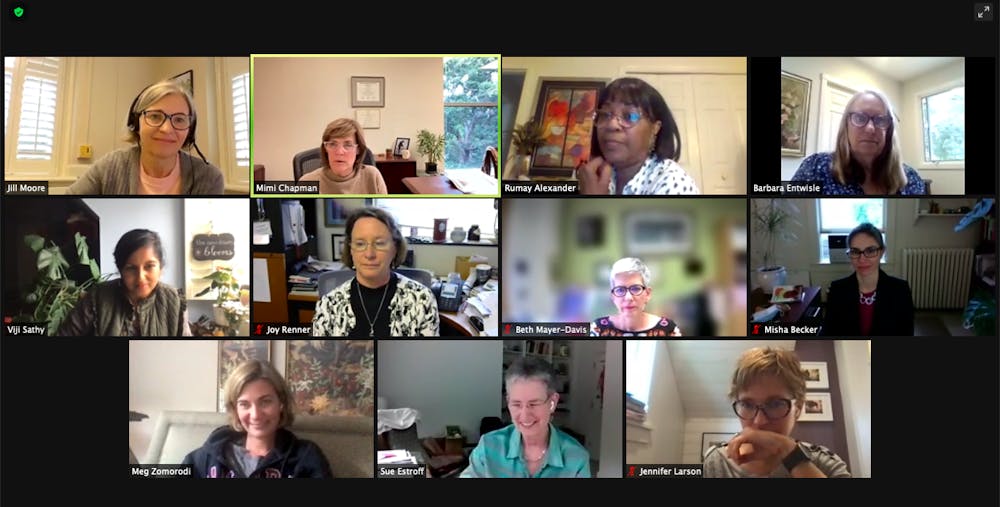“We have accreditation,” Guskiewicz said. “We had to notify SACSCOC (Southern Association of Colleges and Schools Commission on Colleges) today because we changed our academic calendar. For even just one day, we had to notify them of what our plan is for that."
Executive Vice Chancellor and Provost Bob Blouin said that, when he met with University deans, they thought additional wellness days would add more stress to some faculty and students than they would alleviate.
On Sunday, the executive boards of the Undergraduate Student Government and Graduate and Professional Student Government sent a letter to Guskiewicz, Blouin and Vice Chancellor for Student Affairs Amy Johnson requesting for instruction to be paused from Monday to the end of Tuesday.
“We heard overwhelmingly that our students were in need of some time to just pull back to be with one another,” Guskiewicz said. “And again, we could have made that for today, we could have made it for tomorrow. It was very difficult, given the constraints of the semester calendar already, to have it be two days.”
Support for faculty
Rumay Alexander, clinical professor in the UNC School of Nursing, met with the Committee on Community and Diversity on Monday. On behalf of the committee, Alexander asked about the staff’s relationship to mental health days.
She also spoke about the University's need to recognize staff needs to prioritize their mental health.
"They didn’t feel that that was in the communications," Alexander said.
Blouin said declaring a mental health day on behalf of staff cannot be done without legislative authority.
“I think what we have been advocating, to school and/or unit leaders, to bring general compassion to all of their decision making and create flexibility within that unit, where they see fit to do so,” Blouin said.
Guskiewicz said his message Sunday was intended to prioritize the needs of students.
“But I don't want to suggest that we don't recognize that our staff and our faculty are struggling as well," Guskiewicz said.
To get the day's news and headlines in your inbox each morning, sign up for our email newsletters.
Viji Sathy, director for the Center for Faculty Excellence, said certain faculty — namely those who have been responsive to students — are disproportionately impacted.
Sathy mentioned the Mental Health First Aid training as something she thinks faculty should be a part of.
University response
The committee then discussed if the University could send campus notifications to the community earlier, following this weekend's events.
The UNC Police crime log reported the date of the suicide in Hinton James Residence Hall as Saturday at 10:54 a.m. The University sent its first campus email — which acknowledged the deaths of two students in the past month — on Sunday night.
“I think that silence sometimes can be very uncomfortable and in a situation, especially a tragedy, and the longer we're quiet about it, the harder it is to cope,” Sathy said.
Guskiewicz said the privacy of the student's family and the grief that they are experiencing must be respected.
“And while I know everybody wants to be in the know in what this is, I hear what you're saying Viji,” Guskiewicz said. “We're constrained at times by gathering all the facts, especially when there's an investigation involved.”
Based on research and experiences of other colleges and universities, Johnson said that broad-based messages about students death and suicides are not sent out by UNC because those messages can be harmful.
She said her team is currently working on an overview for faculty about how to talk to their students about the events of the weekend.
Mental Health Task Force report
The Report of the Mental Health Task Force, released in April 2019, details the scope of mental health issues on college campuses and at UNC-Chapel Hill. It also makes recommendations on how to address them.
Erica Wise, clinical professor and chairperson of the task force, attended Monday's FEC meeting to discuss the report. She noted while there is a need for more counselors and mental health professionals, who are representative of the student body, it can be a challenge for counseling centers.
Wise said the UNC needs to think about the way it addresses community mental health.
"So it's not only how can we help students who are distressed, but how can we sort of courageously acknowledge the way that the University itself might cause some of the distress," Wise said.
Wise also spoke on the need to think about resources beyond UNC's Counseling and Psychological Services, such as training faculty, staff and teaching assistants to hear student distress and respond appropriately.
"If all students were referred to CAPS, I think the building would collapse," Wise said.
New resolution passed
The Committee then discussed and passed a resolution on the faculty’s authority in deciding upon and communicating class cancellation.
In the resolution, the FEC resolved that the cancellation of classes for student and faculty needs is referred to the Educational Policy Committee, which will study the issues and make recommendations to the Faculty Council about a policy or policies for addressing cancellations.
The Faculty Executive Committee will next meet on Monday, Nov. 1.
Mental health resources
If you or someone you know is thinking about suicide, the National Suicide Prevention Lifeline, 1-800-273-8255, is available 24/7. It is free and confidential.
UNC students who need assistance during this time may contact Counseling and Psychological Services, the Office of the Dean of Students or Student Wellness. CAPS can be reached 24/7 by phone at 919-966-3658. University employees can reach out to the Employee Assistance Program.
Peer supporters from student-run organization Peer2Peer, which offers mental health resources for graduate and undergraduate students, can be reached through their online form. Students can remain anonymous.
The Daily Tar Heel Editorial Board has compiled a list of mental health resources for the Chapel Hill community, which can be found here.
@annaneil5
university@dailytarheel.com




